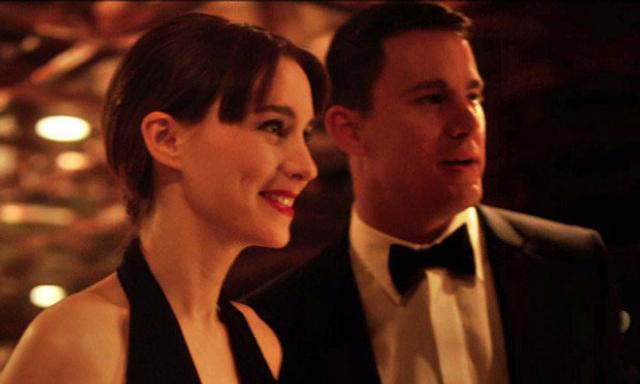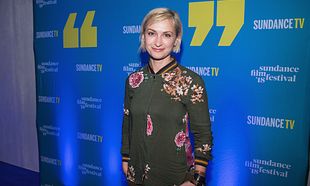"I can only tell the stories that I'm really passionate about", Scott Z. Burns muses down the telephone line from Los Angeles, "if it's a story that really sticks with me, then I figure I should probably sit down and try and write it." The stories that inspired his latest film, Side Effects, must have stuck indeed, because he's spent the guts of ten years taking it from script to screen.
The idea for the thriller, starring Rooney Mara, Channing Tatum, Catherine Zeta Jones and Jude Law, first came to Burns over 10 years ago, when he was doing research at New York's Bellevue Psychiatric Hospital, for a since cancelled television project called Wonderland. Side Effects tells the tale of Emily Taylor (Mara), a young woman dealing with depression and her husband's release from jail. She turns to a doctor (Law) for help, and he prescribes a variety of pills for her to take. All's well until it appears that drugs have some rather dodgy Side Effects.
Burns originally wrote script with the intention of directing it himself, but eventually decided to hand it over to his good friend and long time collaborator Steven Soderbergh. He wanted the piece to be his last film project, and Burns was happy enough to oblige. "It really wasn't that hard a decision. I think it's always sad to let something go that you wanted to direct, but if that is going to happen, better that it be with a friend who knew the script, and as a filmmaker I have such regard for. And in terms of a collaborative experience, I mean the last 8 or 10 years showed me that the movie was going to be in the best of all possible hands."
Side Effects is no ordinary thriller though. It isn't hard to see how the story could spark conversation about depression, medication and our attitude toward mental health, and Burns acknowledges that there seems to be a bit of a trend when it comes to his tales."I think that the things I'm attracted to writing about are things that people can feel, reverberating. I started by trying to make a really compelling thriller and I felt like the best way to make a good thrill ride was to build it through familiar landscapes, and that was my initial impetus was that, if this looks like a world people are familiar with, in a way it's easier to manipulate that. That being said, I think I always hope, you know whether it's a move like this or Contagion, that it will spark some kind of dialogue about the issues that the movie involves."
The Contagion screenwriter is also the man who gave us The Bourne Ultimatum, and he seems to have a knack when it comes to putting us through our paces in the cinema. He doesn't see himself as anything more than a story teller, and certainly doesn't view himself as an expert in the field, but he does have one or two theories about how to make a good thriller. "I think one of the axioms of writing a thriller is to stay ahead of the audience, but the thing you have to measure is how far ahead you can be without losing them. That's a lot trickier on the page, but it's easier when you start editing and realize, oh, I've gone to far. And to realize where the fine line for audience is between curiosity and confusion."
In Side Effects Burns does something that many screenwriters avoid, and hands the power behind the film to his leading ladies. That was a conscious decision on his part, and he's pretty frank when it comes to the reasoning behind it. "I've really tried to write interesting female characters, and people would know that more, but a lot of the times that i've written scripts like that, they're the ones that haven't been made, because Hollywood remains sort of, more confident that a leading male will get the movie made" he explains;
"Years ago I worked on a TV series with Angelina Jolie and she and I talked about this. In a sense we're only using half the crayons in the box by not allowing women to be different things in movies. As a story teller you lose a lot of dynamic, sometimes it feels like you're playing in a band and not using the drums. So always, when I sit down to start, I think should this character be male or female and how does that shift the audience's perspective?"
His tried and tested formula seems to work, and has gained critical acclaim for both Burns and Side Effects, which hits Irish cinemas on March 8th. So, while we're sitting down to enjoy the psychological thriller, where will Scott Z. Burns be, and what's next on the agenda for him?
"I wrote a play about Columbine that Steven and I are hopefully doing in New York later this year, so I just finished the play and hopefully we're going to start rehearsals at some point in the next couple of months. It's really exciting for me because we get to keep working together and it's the story of a survivor from Columbine that I find incredibly compelling", he reveals.
He's also been working on adapting a BBC Documentary called Deep Water, and says he's looking forward to seeing what happens with it, but there's a definite sense that Burns doesn't expect too much too soon. "I'm not really trained as a screenwriter and so I can only do the stories that I feel I can tell and maybe those limitations have served me well because, I think if you become overly ambitious or grandiose about your skills you can overreach" he says.
"I have no illusions, I can only tell the stories I'm really passionate about and that's my guide."









































































